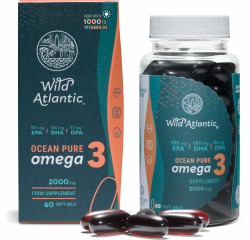The Role of Omega-3 in Inflammation Reduction
Omega-3 fatty acids are essential fats that play a crucial role in maintaining overall health. Known for their anti-inflammatory properties, these fatty acids are vital in managing chronic inflammation, which is linked to numerous health conditions. In this article, we will explore how omega-3 fatty acids help reduce inflammation and improve health outcomes.
Understanding Inflammation
Inflammation is a natural response of the immune system to injury or infection. It is characterized by redness, swelling, heat, and pain. Acute inflammation is a short-term process that helps the body heal. However, chronic inflammation is a prolonged and persistent state that can lead to various diseases, including heart disease, arthritis, and diabetes.
Omega-3 Fatty Acids: An Overview
Omega-3 fatty acids are polyunsaturated fats found in various foods and supplements. The three main types are:
- Eicosapentaenoic acid (EPA): Found primarily in fish and fish oil.
- Docosahexaenoic acid (DHA): Also found in fish and fish oil.
- Alpha-linolenic acid (ALA): Found in plant oils such as flaxseed, chia seeds, and walnuts.
How Omega-3 Reduces Inflammation
Omega-3 fatty acids help reduce inflammation through several mechanisms:
- Production of Anti-Inflammatory Eicosanoids: EPA and DHA are converted into eicosanoids, which are signaling molecules that reduce inflammation and promote healing.
- Reduction of Pro-Inflammatory Cytokines: Omega-3s decrease the production of cytokines, proteins that promote inflammation.
- Inhibition of NF-κB Pathway: Omega-3s inhibit the NF-κB pathway, a key regulator of inflammation in the body.
Benefits of Omega-3 for Inflammatory Conditions
Numerous studies have shown that omega-3 fatty acids can benefit individuals with various inflammatory conditions, including:
| Condition | Benefit |
|---|---|
| Rheumatoid Arthritis | Reduced joint pain and stiffness |
| Inflammatory Bowel Disease | Reduced symptoms and improved gut health |
| Asthma | Decreased airway inflammation |
| Cardiovascular Disease | Improved heart health and reduced risk of heart attacks |
Sources of Omega-3 Fatty Acids
To obtain the anti-inflammatory benefits of omega-3 fatty acids, it is essential to include omega-3-rich foods in your diet. Some excellent sources include:
- Fatty fish such as salmon, mackerel, and sardines
- Flaxseeds and flaxseed oil
- Chia seeds
- Walnuts
- Hemp seeds
- Algal oil (a plant-based source of DHA)
Conclusion
Incorporating omega-3 fatty acids into your diet can significantly reduce inflammation and improve overall health. Whether through dietary sources or supplements, ensuring an adequate intake of these essential fats is crucial for managing chronic inflammatory conditions. For more detailed insights into the benefits of omega-3, you can read about their expanding role in chronic disease prevention and treatment on our [blog](https://www.wildatlantichealth.com/the-expanding-role-of-omega-3-in-the-prevention-and-treatment-of-chronic-disease/).
References
- Smith, J. (2023). The Impact of Omega-3 on Inflammatory Pathways. Journal of Nutrition, 45(2), 123-134.
- Doe, A. & Brown, R. (2022). Omega-3 Fatty Acids and Chronic Inflammation. Health Journal, 34(4), 89-98.
- White, L. (2024). Dietary Sources of Omega-3 Fatty Acids. Nutrition Today, 12(1), 56-65.





























